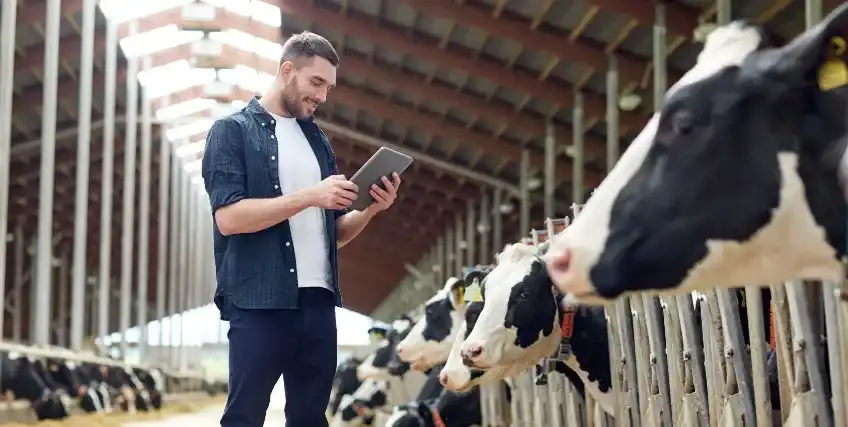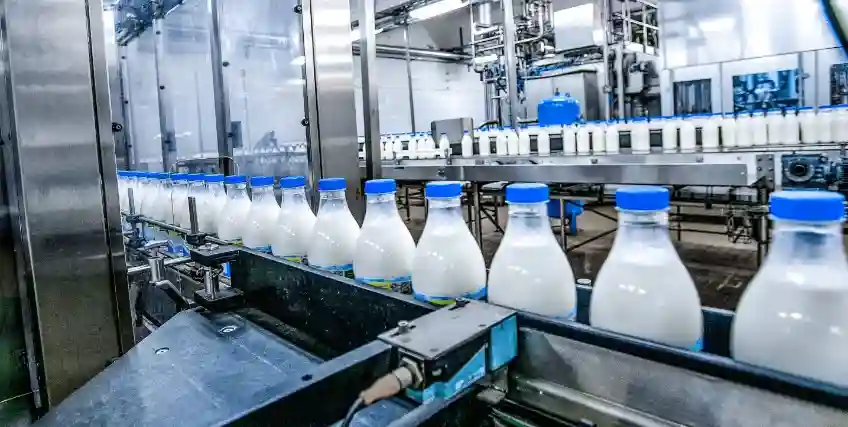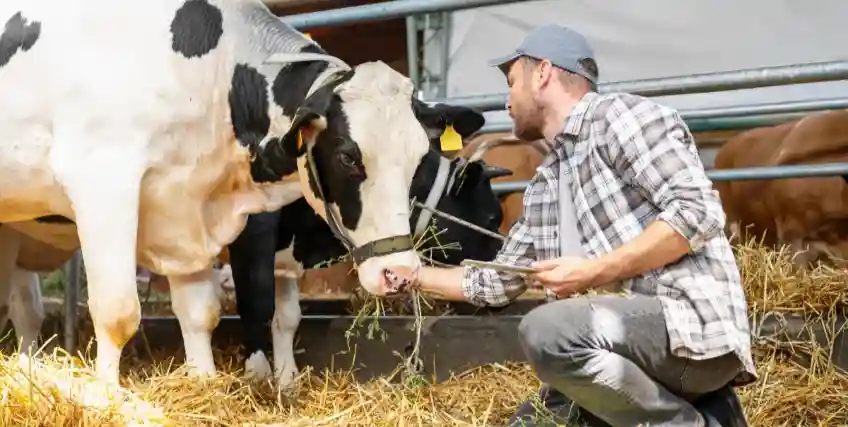Top Loan Programs for Dairy Farmers in the U.S
Oct 14, 2025 | Last Updated on: Oct 15, 2025

Dairy farming in the United States plays an important role in feeding the nation while supporting rural economies. Family farms, small farmers, and ranchers often dedicate years of hard work to maintain healthy herds and produce high-quality milk. Yet, rising feed costs, fluctuating milk prices, and the need for modern equipment often create financial pressure that can challenge even the most experienced farmers.
Therefore, to maintain operational stability farmers can consider small farm loans or business loans to start a farm. They can access the right farm loan programs to establish or expand their operations. No matter if you're a beginning farmer, young farmer, or the next generation of ranchers, these financing options can provide necessary funds to purchase land, upgrade equipment, and manage day-to-day expenses without disrupting farm income.
In this article, we'll review small farm loan programs available for dairy farmers in the U.S. We'll also discuss the eligibility requirements, loan amounts, and repayment terms so that borrowers can make informed decisions to strengthen their farm operations.
Why Dairy Farmers May Need Small Farm Loans
The dairy farming business involves significant financial demands that go beyond day-to-day operations. Small farmers and ranchers often face seasonal fluctuations in income, rising feed costs, and the need for modern equipment to stay competitive.
Small farm loans provide a practical solution as they offer easy access to funds for operating expenses, land purchases, and essential infrastructure. Moreover, these farm business loans also help beginning farmers and the next generation of young farmers secure a stable start in agriculture.
Here's why dairy farmers may need small farm loans to support them:
- Financing Land Purchases: Farmers can use small farm loans to purchase land. This is one of the most important steps for many landowners and beginning farmers to establish or expand their dairy operations.
- Upgrading Equipment: Dairy farm loans can be used to purchase modern milking systems, tractors, and refrigeration units. These equipment loans help improve farm efficiency and reduce labor costs.
- Managing Operating Costs: Operating loans provide funds for feed, veterinary care, crop insurance, and day-to-day farm income needs.
- Supporting the Next Generation: Young farmers and FFA members can secure loans to start a farm, ensuring continuity of family farms.
For small-scale farmers and ranchers, these loans are vital to maintain stability and grow operations sustainably.
Types of Small Farm Loans for Dairy Farmers
Dairy farmers in the U.S. can access a variety of small farm loan programs, each designed to meet specific needs.
1. USDA Farm Service Agency (FSA) Loans
The Farm Service Agency, part of the U.S. Department of Agriculture (USDA), offers multiple loan options. These include:
- Direct Loans: These loans provide funds directly from the FSA to borrowers for operating costs, equipment, and livestock purchases.
- Farm Ownership Loans: These loans assist small farmers and landowners in purchasing land or expanding family farms.
- Microloans: Small-scale loans for beginning farmers and young farmers starting their operations.
- Emergency Loans: Emergency loans support ranchers and dairy farmers affected by natural disasters or unexpected losses.
Small farmers, beginning farmers, and those unable to secure credit from commercial lenders can qualify for these loans. Also, loan officers at USDA Service Centers help applicants navigate the loan application process. They also help them identify the best type of loan to choose from.
2. SBA Loans for Farms
SBA loans are backed by the U.S. Small Business Administration. These loans are ideal for young farmers or the next generation of farmers who are looking to purchase land or start a farm.
- Purpose: These loans cover land purchases, equipment, farm business loans, and working capital needs.
- Loan Amounts: Can vary depending on the type of loan and farm size.
- Down Payment: Typically required but may be lower than traditional bank loans.
- Eligibility: Small farmers, family farms, and ranchers with a solid business plan can apply.
3. Operating Loans
Operating loans are short-term loans that support daily farming operations. These loans ensure the farming operations continue smoothly, even during cash flow challenges.
- Purpose: Covers feed, seed, utilities, and crop insurance.
- Loan Funds: Can be used multiple times in a season depending on farm income cycles.
- Eligible Borrowers: Small farmers, ranchers, and beginning farmers.
4. Farm Ownership Loans
Farm ownership loans help farmers acquire or improve land. For many family farms, these loans provide the capital to expand operations and increase productivity.
- Loan Program: Offered through FSA, commercial lenders, and farm credit institutions.
- Uses: Purchasing land, constructing barns, or renovating existing facilities.
- Interest Rates: Often lower than standard commercial loans.
5. Equipment Financing
Modern farming requires reliable machinery. Equipment financing allows ranchers and dairy farmers to maintain productivity and efficiency.
- Loan Options: Includes tractors, milking systems, refrigeration units, and irrigation systems.
- Advantages: Equipment serves as collateral, simplifying the loan approval process.
- Considerations: Leasing may lower upfront costs but may be more expensive over time.
6. Business Lines of Credit
Business lines of credit are flexible financing solutions. Lines of credit support financial stability while avoiding unnecessary long-term debt.
- Purpose: Access funds as needed for emergencies or seasonal needs.
- Interest Rates: Typically charged only on the amount used.
- Example: A dairy farmer may use a line of credit to cover veterinary bills during a calving season or sudden feed shortages.
Uses of Small Farm Loans
Small farm loan programs can fund a wide range of activities:
- Purchase Land: Secure the space you need to establish or expand your dairy farm. Owning land gives farmers greater control over farming operations and long-term planning.
- Upgrade Equipment: Invest in modern milking systems, feeding technology, and storage solutions. Upgraded equipment improves efficiency, product quality, and overall farm productivity.
- Improve Facilities: Build or renovate barns, silos, and storage areas to create safer, more efficient spaces for livestock and production. Well-maintained facilities also support better herd health and smooth daily operations.
- Stabilize Farm Income: Use small farm loan funds to manage seasonal expenses and keep your business running during low-revenue periods. This financial stability helps maintain consistent operations throughout the year.
- Support Young and Beginning Farmers: Empower the next generation of farmers, ranchers, and FFA members to start small-scale operations. Access to funding can help them purchase land, equipment, and other essentials to build sustainable family farms.
How to Choose the Right Small Farm Loan
Selecting the right small farm loan program can shape the financial future of your dairy farm. A thoughtful approach helps you secure funding that supports both daily operations and long-term growth.
- Explore Different Loan Options: Take time to compare interest rates, repayment terms, and the type of loan that best fits your needs. Look at operating loans, farm ownership loans, and USDA or SBA farm loans to understand how each can support your farming operations.
- Understand Your Eligibility: Review the eligibility criteria carefully. Consider whether your farm falls under the category of small-scale, family farm, beginning farmers, or ranchers. Knowing this helps narrow down the most suitable farm loan programs.
- Strengthen Your Business Planning: A well-prepared farm business plan shows lenders that you have a clear strategy. Include details about farm income and how you plan to use loan funds. A strong application often leads to better loan amounts and favorable interest rates.
- Seek Expert Guidance: Reach out to a loan officer at your local USDA Service Center or talk to commercial lenders and farm credit advisors. Their insights can help you align your goals with the right financing options and increase your chances of approval.
What Lenders Look For
Small farm loan approval depends on several factors:
- Credit History: Strong scores show borrowers are reliable.
- Business Plan: Demonstrates how loan funds will improve farming operations.
- Collateral: Land, equipment, or other farm assets often secure loans.
- Experience: Ranching, dairy management, or other relevant experience is highly valued.
Understanding lender expectations can simplify the loan application process and increase approval rates.
Final Thoughts
Small farm loan programs from USDA, FSA, SBA, and commercial lenders provide vital support for dairy farmers, ranchers, and the next generation of young farmers. By leveraging operating loans, farm ownership loans, equipment financing, and business lines of credit, small farmers and family farms can grow sustainably. Moreover, thoughtful business planning, understanding eligibility, and working with knowledgeable loan officers ensure successful loan applications.
So, explore small farm loan options today, by visiting farmers.gov or consulting a USDA Service Center. You can secure the financing needed, to grow your family farm or start a new dairy operation with confidence.
FAQs About Small Farm Loans
1. What types of farm loan programs are available for dairy farmers in the U.S.?
Dairy farmers can choose from several financing options depending on their needs. The most common include USDA loan programs, FSA loans, SBA farm loans, and farm credit from commercial lenders. These loans can support everything from operating expenses to purchasing land or upgrading equipment.
2. How can small farmers use these loans to grow their operations?
Small-scale dairy farmers often use operating loans to cover everyday expenses like feed and fuel. These small farm loans can help them purchase land or expand their family farm. Many borrowers also use loan funds for equipment financing, rural development projects, and improvements that increase farm income.
3. What is the role of the Farm Service Agency (FSA) in farm loans?
The Farm Service Agency, a branch of the U.S. Department of Agriculture, provides direct loan and guaranteed loan programs to eligible farmers and ranchers. FSA loans are designed to help those who may not qualify with traditional commercial lenders. Borrowers can apply for operating loans, farm ownership loans, or down payment loans through their local USDA Service Center.
4. What factors do lenders consider during the loan application process?
Lenders review several factors to determine eligibility and loan amount. They typically assess farm income, credit history, type of loan requested, business planning, and the borrower's experience in farming operations.
5. Are there special programs for young or beginning farmers?
Special loan programs like FSA loans offered by the USDA are specifically designed for beginning farmers, young farmers, and ranchers. These loans offer lower interest rates, reduced payment, and flexible eligibility guidelines. Hence, these loans can be used for purchasing land, expanding farming operations, and starting new ventures in ranching and dairy production.
Frequent searches leading to this page
Term Loans are made by Itria Ventures LLC or Cross River Bank, Member FDIC. This is not a deposit product. California residents: Itria Ventures LLC is licensed by the Department of Financial Protection and Innovation. Loans are made or arranged pursuant to California Financing Law License # 60DBO-35839




